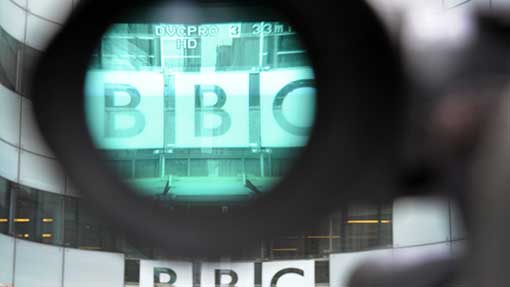BBC failing to capture impact of TB on farmers

The devastating impact of bovine TB on farmers is not being captured by the BBC in its reporting of the badger cull, an independent review commissioned by the corporation’s governing body has found.
The emotional response of protesters was “readily captured” by BBC reporters during last year’s badger cull pilots, but the same “was not the case for farmers”, said the review commissioned by the BBC Trust.
Although the BBC’s overall coverage of the badger cull was found to be impartial in terms of time given, weight and choice of interviewees, audience research indicated that many “did not think the BBC understood the emotional impact of stories it was reporting on”.
See also: OPINION: Farmers left counting cost of bovine TB
“They felt that the emotions of protesters and the animal rights side were clearly expressed and delineated, but the emotion of farmers was not similarly brought to life,” the review stated.
The BBC’s rural audience told researchers the corporation needed to capture the farmer’s emotional response to bovine TB in its coverage of the badger cull.
One rural respondent from Northern Ireland said: “[The BBC needs to portray] more of the impact of what [bovine TB] actually does to a family farm, the financial impact, the stress, what it is to build up a herd of cattle you know, to let the public see that we do care about the animals.
“It’s not just about money, it’s the loss of those animals you’ve bred for years.”
Badger images
In the BBC’s coverage of the pilots, badgers were “by far the most dominant visual motif”, accounting for 50% of images used to accompany reports. By contrast, cattle had “far less prominence”.
See also: Fresh TB outbreak devastates farmer
The predominant use of healthy badgers to open or conclude a BBC report was felt to “weight the argument in favour of the anti-cull lobby”, the report stated.
“People asked where were the pictures of sick badgers with TB, of infected cows being shot, or a distraught farming family coming to terms with the loss of their animals,” the report said.
“To some people, it felt like the images asked: ‘Which do you like most: the cow of the badger?’”
The audience research also picked up criticism of the number of “fluffy badgers” in pictures and said it was “never going to result in an impartial impression in their opinion”, the report added.
Julia Marley, policy committee member of the Campaign to Protect Rural England, told the review: “Badgers – the first thing you see are cute badgers. The argument has already gone. Immediately the impression is formed.”
One BBC viewer said: “It seems like again the farmer was nearly the villain, because he was wanting to cull badgers”.
Another said: “Where is the farmer’s point of view and the cow?”
In the audience research on badger culling, participants often wanted the BBC to answer the simple basic question: “Do badgers spread TB?”
They felt they were “unable to form a view on the cull without knowing this” and “wanted to hear from authoritative sources on it”.
The role of protest groups again was an “issue for the audience”, the report says.
Research showed the single biggest trigger for coverage of the badger cull was an announcement or initiative by the government. However, the second biggest trigger was protests against the culls, at about 10%.
While the impact of the cull on farmers and communities accounted for 8% of network news bulletins.
But according to the audience research, the BBC’s focus on protest “did not bring clarity to the story”.
Missed opportunity
Meanwhile, the review of the BBC’s coverage of rural affairs concluded that its coverage of the winter floods of 2013-14 were a “missed opportunity”.
“Many contributors to this review from June to November 2013, coming from different perspectives, identified land management for flood alleviation, and its consequences for farmland, as a critical and under-reported issue for rural UK,” the review noted.
The review, by Heather Hancock, a former civil servant and ex-chairman of the BBC’s rural affairs committee, concluded that the corporation’s coverage of rural affairs was, on the whole, impartial.
The report found that the BBC’s flagship specialist programmes, particularly Countryfile and Farming Today were “highly appreciated” by audiences and included a “wide range of voices and opinions”.
The report also highlighted that the BBC’s reporting on the countryside focused too much on environmental issues, instead of the economic and social issues that affect rural people’s lives.
Metropolitan bias
News and current affairs reporting in Scotland, Wales and Northern Ireland had an “impressive depth of the issues and a breadth of voices”, the report said.
However, it highlighted a metropolitan bias in BBC network news coverage from England.
“News and current affairs output from rural England does not appear to be reaching the UK network programmes”, it stated.
Alison Hastings, BBC trustee and chairman of the BBC Trust’s editorial standards committee, said: “The 12m people in the UK living in rural areas must have confidence that the BBC is both reflecting their lives and, where relevant, telling national stories from a rural perspective.
“To this end, it must tackle the deficit in its network coverage of rural England, and broaden the range of voices it features on rural issues on network news.”
Commenting on the report, Barney White-Spunner, executive chairman of the Countryside Alliance, said the organisation had “long been vocal” in its concerns about the BBC’s coverage of rural issues.
“That is not to say that programmes such as Countryfile are not valid and interesting, but they are not a true reflection of the realities of rural life and livelihoods,” he added.
What do you think? If you have an opinion on this issue email farmers.weekly@rbi.co.uk or post your comments on our forum.
